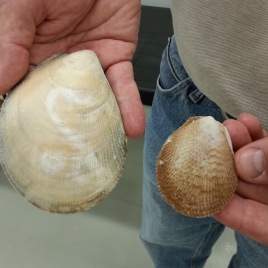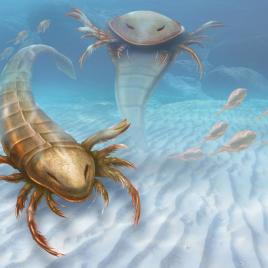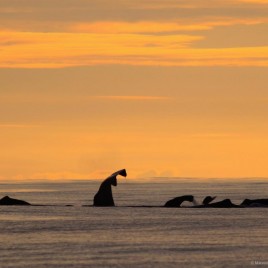Sperm whales learn different ‘dialects’ of their ‘click’ sounds through cultural learning, a method of learning found in both Orcas and humans, say researchers. This reinforces the idea that the same processes responsible for the formation of human cultures can operate in animal societies. Sperm whales live in clans – groups of families that can […]
Who owes what? Quantifying global climate debt
A letter in Nature Climate Change presents a new way to quantify the contribution each country has made to climate change through a nation’s carbon and climate debts. This new method ranks Canada as the fourth largest climate debt-holder. Considering only national CO2 emissions from fossil fuel combustion accumulated between 1990 and 2010 the […]
Common molecular toolkit shared across the Tree of Life
The assembly instructions for nearly 1,000 protein complexes shared by most kinds of animals have been revealed, offering a new tool for studying the causes of diseases like Alzheimer’s and different cancers. Proteins come together to form complexes, or molecular machines, which are responsible for certain functions in cells. The new research indicates that most […]
Global tree count: Seeing the forest through the trees
There are approximately three trillion trees in the world, according to density estimates of every continent except Antarctica, a number much larger than previous estimates of just over 400 billion trees. However their research also estimates that humans have cut down 46 per cent of the world’s trees since the beginning of human civilization. The […]
Need your umbrella? The history, and future, of weather prediction
Today’s weather forecasts are able to accurately predict the weather an extra day in advance, compared to a decade ago. The authors write that every decade has provided another day of accurate prediction to the weather forecasts; they believe that today’s 6-day forecast is as accurate as a 5-day forecast 10 years ago. In this […]
Weather impacts on insect gender
The gender of certain insects can be determined by the weather, and therefore influenced by climate change, according to new research. The authors believe this is the first study to show the effects of weather on insect gender. From 2008 to 2010 Researchers captured newly hatched weevils (Curculio elephas) after they emerged from the soil. […]
A new understanding of pig domestication
Domesticating the pig turns out to be more complicated than we thought. We used to think they were domesticated by isolating small populations and selectively breeding for certain traits, however this does not appear to be the case for pigs. By analyzing the genomes of over 600 domestic pigs and wild boars from Europe and […]
Arctic warming linked to cold winters in North America
Warming in certain areas of the Arctic can cause cold winters in North America and Asia according to climate model simulations. Researchers believe the findings may help improve the prediction of winter weather and extreme events in North America and East Asia. The results suggest that atypical warming in the Arctic Barents-Kara Sea precedes severe […]
Canadians receiving false positives for Lyme disease from U.S. labs
Canadians may receive false-positives for Lyme disease, from some commercial labs in the United States over half the time, according to an editorial in the CMAJ. Lyme disease, which is becoming more common in Canada, is spread by ticks and causes fatigue, swollen lymph nodes, and if not treated, the infection can spread to joints, […]
A new “silent spring”
An editorial is calling the dumping of plastic waste into the ocean a new “silent spring”. “Silent spring” was a book written in the 1960s outlining the harmful effects of the overuse of pesticides on the environment. It was instrumental in raising public awareness of the potential dangers of pesticides. The authors of the paper […]

New Giant Clam species discovered off Newfoundland coast
A new species of clam, the giant file clam (Acesta cryptadelphe) was discovered off the coast of Newfoundland. The species was first spotted over 30 years ago, and thanks to DNA analysis it has been confirmed as a new species. The species is so similar to the file clam that the scientists decided to name […]

New species of giant sea scorpion
An ancient species of giant sea scorpion, Pentecopterus, which could grow up to six feet in length, has been identified after examining more than 150 fossil specimens of both adult and juvenile specimens. The fossils were uncovered in Iowa and lived approximately 460 million years ago. The species likely lived in a shallow mix of […]
Low vitamin D levels associated with an increased risk of MS
Low vitamin D levels are associated with an increased risk of multiple sclerosis (MS) in European populations, however whether vitamin D can delay or prevent the onset of MS requires further investigation, according to researchers. The authors used data from the International Multiple Sclerosis Genetics Consortium study, which involves 14,498 people with multiple sclerosis and […]

New guidelines to reduce pain during vaccinations
New Canadian guidelines aim to reduce pain during vaccinations in both children and adults. Pain during the vaccination process can make children and adults hesitant to receive future immunizations. The guidelines update previous guidelines, published in 2010, and have been expanded to cover adults as well as children. The recommendations are designed to be used […]
Obstetricians and family doctors have equal outcomes for low-risk births
During low risk births, the risk of newborn death and maternal complications is similar for deliveries performed by family physicians and those performed by obstetricians, according to a new study. The authors note that these findings should only be applied to low-risk deliveries that could be safely performed by either a generalist or a specialist, […]
Tracing the family history of HIV
Lentiviruses, a group of retroviruses including HIV and SIV, the simian version of HIV, have been infecting primates as far back as 16 million years ago according to DNA sequencing. Researchers studied an antiviral gene called TRIM5 in 22 species of African primates. They found that a cluster of changes unique to the TRIM5 proteins […]

